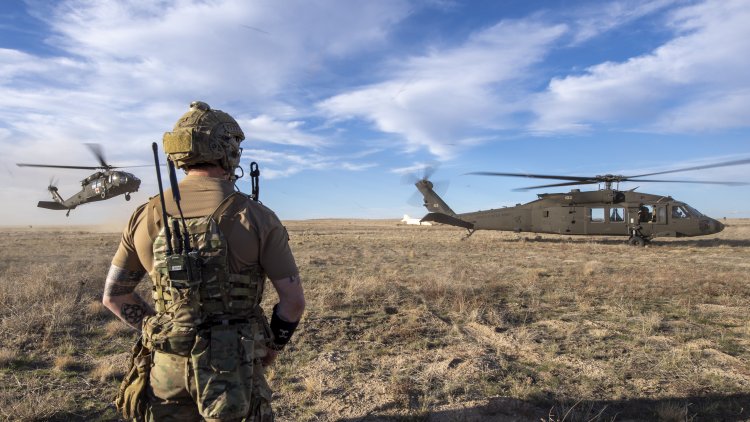This article originally appeared in the 2022 First Quarter edition of Reserve & National Guard Magazine.
Expanded benefits and opportunities for guardsmen and reservists are key as the Reserve Organization of America (ROA) identifies its 2022 legislative priorities. Health care provisions to ease members’ financial burdens, along with a more comprehensive DD214, are chief among these priorities.
Retired Coast Guard Reserve Capt. Robert H. Carmack, ROA national president, said that current DD214s only document active-duty service.
“Reservists and Guard members who never activated, or only activated for a certain timeframe, don’t have the documentation required to be buried in a VA cemetery, to compete for a federal government job, or to receive other numerous benefits, such as the GI Bill,” Carmack said. “For these soldiers, there is no official document of their full military career recognized by the VA or employers.”
ROA supports the passage of Senate Bill S. 1291, Record of Military Service for Members of the Armed Forces Act of 2021 that would replace the current DD214.
In 2017, the organization adopted Resolution No. 20-04 – DD Form 214 Issued upon Separation from the reserve component. This resolution states that “reserve component members should have the same level of access to earned benefits as active duty and changing how the DD Form 214 is issued will remove the existing barrier National Guard and reserve members face by not receiving a 214 that includes the entirety of their service.”
“As a reservist, you can be activated many times and receive many DD214s, but there is no document that reflects everything,” said Jonathan Sih, director of legislation and military policy. “We have reservists who have served enough days to qualify for certain benefits but don’t have proof because there’s no documentation at the end of their career to prove it.”
If approved, the legislation would create the Certificate of Military Service, which would standardize service records among active duty and reservists, National Guardsmen and the Coast Guard.

The certificate, according to the bill summary, would “be issued to members of the reserve components upon the occurrence of any of the following events: permanent change to duty status (e.g., retirement or transfer to active duty); discharge or release from temporary active-duty orders; specified promotions; and transfer to another state National Guard.”
Sih said reservists currently “have to jump through hoops” to receive the same benefits as active duty.
“They’re doing the same job, but not getting the proof through documentation, so they’re not receiving the benefits,” he said.
Health care benefits
Currently, active-duty members receive full health care, with no out-of-pocket costs. However, this is not the case for reservists and guardsmen.
“I’m an Air Force reservist,” Sih said. “For me to stay deployable in the Air Force, I’m required to pay for my insurance. It costs me to maintain my deployability. Currently, there is no difference in the requirements between active duty and reservist, so this puts a lot more burden on the reservist.”
In 2018, the ROA created a resolution to rectify this disparity for service members and their families. In 2021, the H.R. 3512 – Healthcare for Our Troops Act was introduced in Congress and is a priority for ROA.
ROA decided to pursue legislation for no-fee health care for National Guard and reserve service members because of a 2018 DOD memo, “DOD Retention Policy for Non-Deployable Service Members,” Sih said.
“This change in policy discharges any service member who has been non-deployable for more than 12 consecutive months,” Sih said. “In January 2018, DOD reported approximately 11%, or 235,000 active and reserve component members who were non-deployable for a variety of reasons, including for medical conditions. Now that DOD has changed the policy and medical issues are a factor in continued service, then they should provide medical care to maintain deployable standards.”
RELATED: New legislation impacts guardsmen and reservists, their families
H.R. 3512 would provide reservists with individual coverage through TRICARE Reserve Select with no premiums, but a premium would be paid for immediate family members under the same coverage. A monthly premium, according to the bill, would be “the amount equal to 28% of the total monthly amount determined on an appropriate actuarial basis as being reasonable for that coverage.”
Employer tax credits
“We expect a lot of employers to employ reservists and Guard members who are called up several times over their careers,” Carmack said. “And, the number of times they get called up has been accelerating. Some get called nearly a dozen times.
“Most employers support our members and welcome them back. But sometimes the employer has expenses, such as hiring temporary replacements. This tax credit would help ease that pain a little for them.”
Introduced to Congress in early 2021, the passage of H.R. 1854 Reserve Employers Comprehensive Relief and Uniform Incentives on Taxes Act of 2021 [or the RECRUIT Act of 2021] is a significant legislative priority for ROA leadership in the coming year.
This bill would allow employers with less than 500 employees a new payroll tax credit for 40% of the wages paid to a member of the National Guard or a reserve component of the armed forces.










































